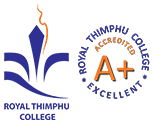This combination course is arguably the best fit for students pursuing business and government careers addressing environmental policy issues. These subjects not only complement each other but also provide answers to our current development problems, balancing environmental protection with economic development. The program guides the student of economics to carry a more balanced view-point on economic growth. A degree in this combination of subjects will create immense potential for obtaining jobs both in Bhutan and internationally.
Curriculum Map
|
Year |
Sem |
Modules |
||||
|
1 |
l |
MIC 101: Microeconomics- l |
AMT 102: Foundation of Statistics |
ES 111: Introduction to the Environment |
PS 112: Introduction to Demography |
ACS 101: Academic Skills |
|
ll |
MIC 102: Microeconomics- ll |
MAC 101: Macroeconomics - l |
ES 121: Natural Resources |
PS 122: Basic Demographic Methods |
APC 101: Information Technology Skills |
|
|
2 |
lll |
MQM 201: Mathematical Methods of Economics |
MAC 202: Macroeconomics-ll |
DZC 201: Dzongkha Communication |
ES 231: Natural Resources Management |
PS 232: Bhutanese Population, Culture and Economy |
|
lV |
ECR 201: Bhutanese Economy |
ECH 201: History of Economics Thoughts |
ECF 201: Money & the Financial System |
ES 241: Air and Water Pollution |
PS 242: Public Health and Environment |
|
|
3 |
V |
ECF 302: Public Finance |
ECR 302: Developmental Economics |
RSM 301: Research Methods |
ES 351: Sustainable Development |
PS 352: Population and Development |
|
Vl |
MQM 302:Introductory Econometrics |
ECH 302: World Economic History |
ES 361: Environmental Planning and Impact Assessment |
PS 362: Statistical Methods in Population Analysis |
ES 363: Waste and Waste Management |
|
Modules and Prescribed Textbooks for Semester 1*
*Students interested in pre-purchasing any of these textbooks should verify with the Academic Affairs Department whether there have been any changes to the recommended textbook list, one month in advance of the semester start date.
- ES 111: Environmental Science: Towards A Sustainable Future (11th Edition); Author: Boorse Wright; Publication:PH Learning Pvt. Ltd; Price List: Nu.650
- PS 112: Demography and Population Problems; Author: Rajendra k Sharma; Publication: Atlantic Publishers & Distributors (P) Ltd; Price List: Nu.250
- MIC 101: No recommended Textbook
- AMT 102: No recommended Textbook
- ACS 101 Textbook: A coursepack on Academic skills will be available for purchase at the college.
Economics
Economics studies how households, businesses and governments make choices about how to allocate scarce resources in order to best satisfy individual and social needs. The tools of economics can be used to analyze issues as diverse as unemployment, inflation, globalization, discrimination, environmental issues and taxation. RTC offers courses in microeconomics and macroeconomics, and in selected fields such as money and banking, labor economics, international economics, development economics, and industrial organization.
Economics is widely accepted as the queen of social sciences. Those who wish to develop timeless and internationally accepted skills for a brighter future should opt for this subject. It provides rigorous training in economic principles, methods of economic analysis, and relevant quantitative techniques. It also enables students to apply theoretical knowledge to policy and business formulation through focus on subject-specific skills, cognitive skills and practical skills.
Since the skills that are acquired from studying economics are transferable, economics graduates have access to a wide variety of jobs such as planners, financial analysts, investment analysts, financial planner, academicians, business managers, trade and foreign exchange experts, auditors and bankers. Students can look forward to promising career opportunities both within and outside the country with a variety of organizations after studying economics.
Modules offered in this program
Macro Economics-I
Micro Economics -II
Macro Economics-II
Public Finance
Money and the Financial System
Developmental Economics
World Economic History
Introductory Economics
History of Economics Thoughts
Foundations of Statistics
Mathematical Methods for Economics
Bhutanese Economy
Research Methods
Environmental Studies
Environment has come to occupy a central place in modern development parlance. Growing concerns about the sustainability of the modern economic growth process has transformed environment science into an increasingly significant area of study.
This program covers a range of relevant topics that are critical to understanding the interaction between man and his environment. It takes a multidisciplinary approach to learning which is most aptly combined with economics for better future job prospects as environmental economists. The importance of environment in the philosophy of GNH makes study of this subject all the more relevant in the context of today’s Bhutan.
Elevated interest and concern for the environment has not been the preserve of governments only. With knowledge of environmental science, graduates can also guide companies in green practices - preventing pollution, reducing waste, appropriate use of energy, materials and natural resources.
Many faculty members are involved in research which offers students the added bonus of being involved. Regular field trips provide yet another real world experience, which is a great learning tool that increases the marketability of EVS graduates.
Due in part to the current spotlight on the environment, graduates of this program are in high demand. Current jobs in this diverse and expanding field focus on land use and natural resources, environmental protection, conservation and preservation of natural resources, and environmental sustainability.
Modules offered in this program
Introduction to the Environment
Natural Resources
Natural Resources Management
Air and Water Pollution
Public Health & Environment
Environmental Planning and Impact Assessment
Waste and Waste Management
Sustainable Development
Introduction to Demography
Basic Demographic Methods
Bhutanese Population, Culture and Economy
Population and Development
Statistical Methods in Population Analysis
